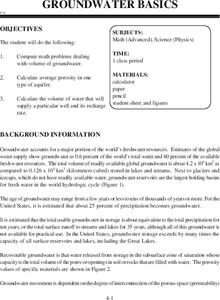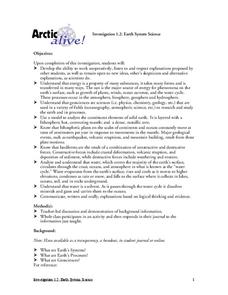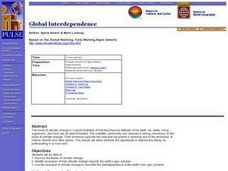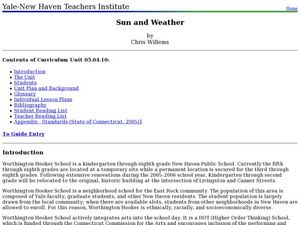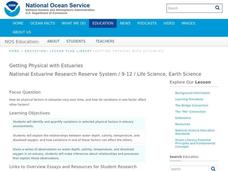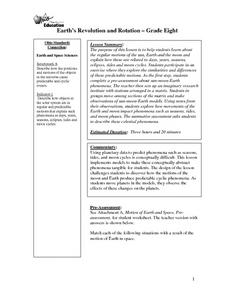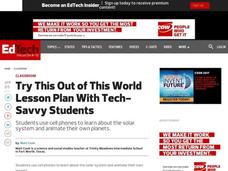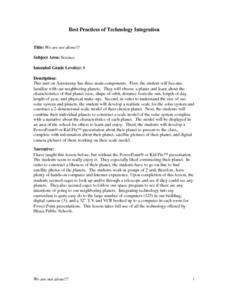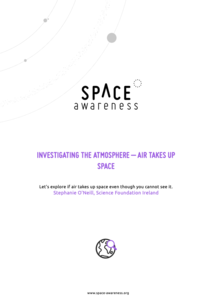Curated OER
Groundwater Basics
Groundwater is an essential natural resource, not to mention a fascinating topic to study. Here is a series of twelve amazing lessons on the water source and how we use it in our daily lives. Concepts require higher math and physics...
Curated OER
Earth System Science
Students explore the Earth and its ability to support life. They discuss the geosphere and the water cycle and complete the Water Wonders activity. After completing the activity, they respond in their journals and reflect upon the...
Curated OER
World Geography: Global Interdependence
Learners are able to discuss the theory of climate change. They identify examples of how climate change impacts the earth's geo-spheres. Students are able to use the example of climate change to describe the interdependence of the...
Curated OER
The Seasons
Discover the change of the seasons by modeling the Earth-Sun system. Learners model the orbit of the Earth around the sun and explore how and why the patterns of winter and summer occur.
Curated OER
Exploring Density with Salt and Fresh Water: Part 5
This particular lesson was written by the National Earth Science Teachers Association, but density is a concept that you can teach at the beginning of the school year in your life, physical, or earth science classes. It would be fun to...
Curated OER
Sun and Weather
How is the Earth's weather created? Middle schoolers will explain how the Sun's energy is transformed into different forms. They will perform mathematical calculations of volume, mass, and temperature. They they will explain the...
California Academy of Science
Coral and Chemistry
Using cabbage juice as a pH indicator, future scientists explore the effect of increasing carbon dioxide on the pH of the ocean and relate it to the health of coral reefs. Ideal for an earth or environmental sciences course, this lesson...
Curated OER
The Geography - Writing Connection
Students examine and describe the four physical systems of the Earth. Using two of the systems, they practice their writing skills and use vocabulary associated with the different types of landforms. They predict the types of shelters...
Curated OER
African Savanna
First graders are introduced to the ecosystems of savannas throughout the world. Using new vocabulary, they identify and describe the characteristics of a savanna and the animals that live there. They also describe the Earth's physical...
Curated OER
Our Solar System
Students analyze the theories of the formation of the universe and solar system. Students analyze planetary motion and the physical laws that explain that motion: Rotation, Revolution, Apparent diurnal motions of the stars, sun, and...
Curated OER
Getting Physical with Estuaries
High schoolers study estuaries and how the physical factors change over time. In this investigative lesson students use a website to gain knowledge of estuaries then in groups they create and present their charts.
Curated OER
Earth's Revolution and Rotation
Eighth graders investigate the regular motions of the sun, Earth and the moon and explain how these are related to days, years, seasons, eclipses, tides and moon cycles. They participate in an exercise where they explore the...
Curated OER
Out of This World
Fifth graders animate their own planets. In this solar system instructional activity, 5th graders use smartphones and the software, GoKnow Sketchy, to create images for presentations on their created planets that appear to be animated...
Curated OER
You Are Here
Students determine the relative size and distance of the planets in the solar system. They use ratios in their mathematical calculations to make models of the planets after discussing the relative sizes of the planets. They keep a...
Curated OER
A View Of Home From The Front Door and From Space
Learners discover how distance can change how our view of an object. Students build a representative model of where their home is located from different distances. They create three drawn models of their home from various elevations as...
Curated OER
We Are Not Alone!!!
Eighth graders explore the area of astronomy. They explore Earth's neighboring planets. Students research a planet's characteristics. They develop a scale model of the solar system and a narrative about the planets.
Curated OER
Jeopardy 8th Grade (Science)
There are so many topics touched upon in this Jeopardy-style science game, that it is difficult to classify! The categories include electricity, matter, ecology, earth and space, and scientific investigation. This would best be used at...
Curated OER
The Dynamic Earth
Students use the Internet to investigate earthquakes and plate tectonics. In this plate tectonics lesson, students complete a web quest with multiple links and activity types relating to earthquakes and volcanoes. They connect the...
Teach Engineering
What's Wrong with the Coordinates at the North Pole?
Here is an activity that merges technology with life skills as individuals use Google Earth to explore the differences between coordinate systems and map projections. The self-guided activity is the fourth segment in a nine-part unit....
Earth Day Network
Filtering Water
See the water filtration system up close with a fun science experiment. Young scientists work for several class periods to design a water filter using household objects, and then decide which filter material would be most effective in...
Space Awareness
Investigating the Atmosphere - Air Takes Up Space
How do you know there is air? Can you see it, smell it, feel it? To begin the investigation, learners watch a video and discuss what they know about air and the atmosphere. Then, they participate in five different hands-on, inquiry-based...
Colorado State University
If You Can't Predict the Weather, How Can You Predict the Climate?
Why is the weather man wrong so often? Young climatologists discover how chaos rules both weather and climate through a math-based activity. Using an iterative equation, the class examines how small day-to-day weather events total up to...
Curated OER
Create Your Own Country Project
Young scholars demonstrate their knowledge of geography with this fun, collaborative social studies project. Working in small groups, students develop their very own countries, writing descriptions of their physical location, social...
Cornell University
Classification
Explore the scientific method of classification. An interactive activity asks learners to create a classification system for a group of objects and develop a flow chart to communicate their systems. In addition, individuals use a...


